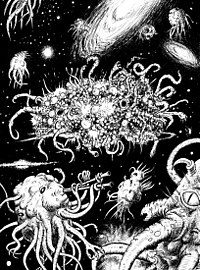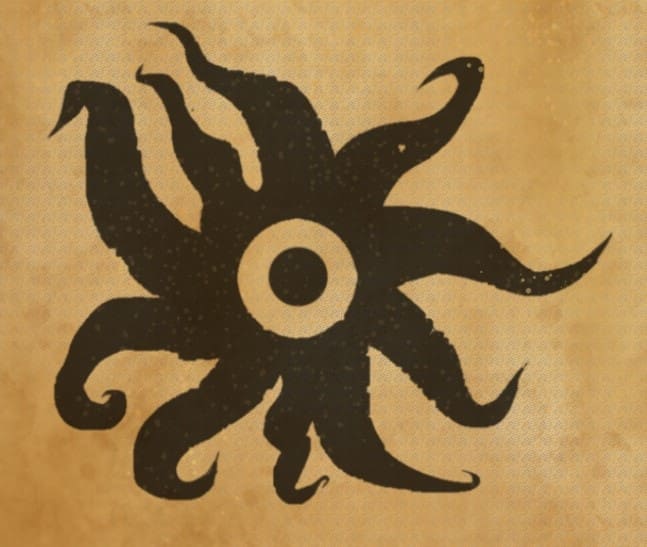Para a versão em Português, clique aqui!
Who—or What—is Azathoth?
Never, in any realm of existence—not in this reality, nor in past or future ones, nor in the countless dimensions that time shall never touch—has there been a being as profane, as primordial, as immeasurable as Azathoth. Its name is an affront to sanity, one that, when uttered, can shatter the minds of those foolish enough to whisper it. And yet, this name—itself a barbarous and vile insult—is but a pale shadow of the horror that is its true title, a secret beyond the fragile grasp of human comprehension.
Azathoth, the Maddening One, the Idiot God, the Blind and Boundless, does not dwell within the cosmos—rather, the cosmos dwells within *it*. Reality itself, so precious and solid in the eyes of mortals, is but a fleeting, insignificant dream, drifting in the unfathomable depths of its slumbering presence. It does not see, does not hear, does not think, lost as it is in eternal sleep. Galaxies are born and unmade, pulsing within a chaotic vortex of which even it remains unaware—mere illusions within a mind that does not exist. A universe that is nothing more than an indifferent speck in the vastness of an inconceivable being.
And yet, there are fools who worship it. The deranged seek its voice, hoping to catch but a fragment of its truth—yet all they find is the abyss, whispering back.
Azathoth: The Blind God and the Chaos Behind Existence
Azathoth stands as one of the most enigmatic and terrifying figures in Lovecraftian mythology. Though less widely known than the infamous Cthulhu, it is the supreme antagonist within the Lovecraftian pantheon. Its elusive nature only deepens its dread—the less we comprehend it, the more it haunts our imagination. Azathoth’s name first emerged, albeit obscurely, in an unfinished tale simply titled Azathoth. From there, it slithered into other stories, invoked either by name or by ominous epithets such as the “Blind Idiot God” and the “Primordial Chaos”.
In The Dream-Quest of Unknown Kadath, Azathoth is mentioned explicitly. According to the Cthulhu Mythos, it slumbers in the void, and from its dreams, existence itself was spun. Now it lingers in that eternal stupor, while lesser beings pipe mindless flutes and beat maddening drums to keep it asleep. For should Azathoth ever wake, the dream would end—and with it, all of reality would vanish into the abyss.
This “Blind God” is said to have spawned Nyarlathotep and Nyog’sothep, and it is even the great-great-grandsire of Cthulhu itself.
Lovecraftian Mythology: The Idiot God
Azathoth as the Embodiment of Lovecraft’s Cosmic Chaos
For Lovecraft, the universe was an immeasurable void—cold, indifferent, and utterly hostile to human existence. In this bleak cosmology, Azathoth reigns supreme: a mindless, ravenous god, blind and babbling, perched at the very heart of creation.

The irony is grotesque. The axis around which all reality spins is not order, not wisdom, but a slumbering abomination that dreams existence into being without ever knowing it does so.
Here, Lovecraft’s vision reaches its most nihilistic extreme. Azathoth is no benevolent creator, no divine architect—it is chaos incarnate, a seething mass of primal insanity. The cosmos is not its masterpiece, but an accident, a fleeting delirium in the fevered sleep of something too vast to comprehend. And should it ever wake? The dream ends. And with it, everything.
Described as encircled by a court of lesser “demons” piping a cacophonous melody to lull its eternal slumber, Azathoth looms as a perpetual, dormant threat. This grotesque tableau—a god lost in dreams, its frenzied guardians labouring to stifle its awakening—hints at a universe balanced on a knife’s edge. The slightest stirring of Azathoth would unleash annihilation beyond mortal comprehension.
Its true purpose—or even its origin—remains shrouded in impenetrable mystery, deepening the terror it evokes. Azathoth is primordial force stripped of intent or reason, chaos distilled into pure, mindless form. A deity without dominion, without design, it mirrors the very cosmos Lovecraft feared: a realm ruled by indifferent, merciless laws.
To Lovecraft, Azathoth embodies the futility of mankind’s struggle to fathom the cosmos. Its epithet, the “Idiot God,” is no mere jest, but a damning indictment—a reminder that logic and meaning are illusions in the face of something so vast, so alien, that it defies comprehension entirely.
Azathoth: The Pinnacle of Human Insignificance
In a universe wholly indifferent to mankind’s fate, Azathoth stands as the ultimate embodiment of our cosmic irrelevance. It represents a deity devoid of purpose or reason—a mindless sovereign presiding over an unconscious, chaotic cosmos. This shatters any pretence of humanity occupying a privileged position in existence. Where Cthulhu embodies fear of the unknown, Azathoth represents the purest terror: the revelation that at the heart of all things lies nothing but a yawning, unthinking void.
By positioning Azathoth at the universe’s core, Lovecraft suggests that what humans perceive as “reality” is merely a fragile façade—a fleeting dream in the mind of a slumbering monstrosity. This notion utterly undermines the anthropocentric delusions of Western religion and philosophy, which presume humanity to be the measure of all things. More damning still, Azathoth symbolises the complete collapse of grand narratives. Where once we imagined gods with intention, order or design, Lovecraft presents a reality where the supreme deity lacks consciousness, will or meaning altogether.
As the cornerstone of Lovecraftian horror, Azathoth encapsulates the essence of cosmic dread. It serves as the definitive symbol of a universe governed by chaos—one in which humanity is reduced to a helpless bystander before forces beyond comprehension, beyond mercy, and beyond any hope of resistance.
Azathoth: A Cosmic Riddle

Though Azathoth stands as one of the most potent and significant entities in the Lovecraftian pantheon, it is never directly or thoroughly described in Lovecraft’s works. Its presence remains perpetually implied, manifesting in an abstract, almost intangible manner rather than through physical form.
This very characteristic proves essential for preserving the mystique that makes the entity so profoundly terrifying. Lovecraft references Azathoth in fragments of stories and letters, yet never as the ‘central protagonist’ of any narrative – unlike Cthulhu, who enjoyed considerably more ‘screen time’. This perfectly reflects Lovecraft’s approach: the most effective terror lurks precisely at the threshold of comprehension.
Within Lovecraft’s universe, Azathoth represents the most primordial being and is considered the unconscious creator of the entire cosmos. Certain texts suggest Azathoth spawned the other Outer Gods (including Nyarlathotep, Yog-Sothoth and Shub-Niggurath) as either aspects or direct descendants.
In this cosmic family tree, Azathoth stands as ‘father’ to Nyarlathotep, the Nameless Mist and the Darkness That Waits. He’s ‘grandsire’ to Yog-Sothoth and Shub-Niggurath, who in turn gave rise to entities like Cthulhu and Tsathoggua.
Lovecraft consistently associates Azathoth with musical imagery, particularly through its entourage of ‘maddening drums’ and ‘piping flutes’. This dreadful symphony finds eerie echoes in ‘The Music of Erich Zann’, where the violinist may well be playing a melody invoking this very cosmic aura.
The Name’s Origin
The name ‘Azathoth’ remains shrouded in mystery itself. While no definitive etymology exists, scholars speculate Lovecraft drew upon mythological sources. Thoth, the Egyptian god of wisdom, presents one possible influence. Other theories suggest Anathoth (Jeremiah’s biblical birthplace), the alchemical term ‘Azoth’ used by Edward Waite, or even the demon Azazel. Some scholars alternatively propose inspiration from Mana-Yood-Sushai in Lord Dunsany’s Gods of Pegāna tales.
Azathoth in Modern Culture
Though less renowned than Cthulhu, Azathoth plays a pivotal role in perpetuating cosmic horror within popular culture. It typically appears as an invisible presence, yet its influence runs disturbingly deep. Its followers – often portrayed as raving lunatics or deluded cultists – maintain that Azathoth’s awakening would bring about universal annihilation: a proper cosmic apocalypse.
In video games, Azathoth’s influence permeates titles like Bloodborne, thoroughly steeped in Lovecraftian cosmic horror. While never directly named, the game’s ‘Great Ones’ – those cosmic entities dwelling beyond mortal comprehension – distinctly echo the concept of blind, indifferent deities. Azathoth has also been referenced within Marvel’s comic book universe.
Contemporary authors such as Stephen King and Neil Gaiman have drawn heavily upon the concept of incomprehensible entities like Azathoth in their own works. Thomas Ligotti likewise makes reference to this cosmic being in several of his short stories.
Films including Annihilation (2018) and Event Horizon (1997) explore Lovecraftian themes by demonstrating how encounters with cosmic entities can lead to madness and devastation. Azathoth has even appeared in series like Doctor Who, serving as an avatar for a group of beings known as the Great Old Ones. Through these manifestations, the concept of Azathoth as a chaotic, unfeeling deity has adapted to numerous forms within popular culture – particularly in works dealing with existential horror.
This enduring influence demonstrates how Lovecraft’s cosmic horror – and the figure of Azathoth in particular – continues to inspire creators to probe the limits of human reason and the fundamentally chaotic nature of the universe.
The Allure of Existential Horror
The fascination with Azathoth is deeply entwined with the existential horror that pervades H.P. Lovecraft’s works. In a world increasingly dominated by science and technological advancement—where traditional notions of order and purpose seem fragile—Azathoth embodies the unsettling realisation that the universe is, in truth, utterly indifferent. Whereas other mythological or horror deities often represent comprehensible forces—gods of war, nature, or death—Azathoth defies such categorisation. It possesses no personality, no intentions, no motivations whatsoever.
Amid rising global anxieties—from climate crises to social upheaval and technological disruption—the sense of being at the mercy of invisible, chaotic, and uncontrollable forces ensures Azathoth remains an enduring icon. Though rarely depicted in detail within the stories, its presence looms over Lovecraft’s entire body of work as the pinnacle of horror. Azathoth is seldom mentioned directly, yet its influence is felt everywhere. This form of terror resonates powerfully with modern audiences, who often find greater fear in what they cannot see or comprehend. Azathoth need not intervene directly in narratives; its mere existence is disturbance enough. The lack of direct interaction makes it all the more terrifying—utterly beyond reach, both physically and metaphysically. This renders it an inexhaustible source of fascination for writers and creators across media.
The Horror of Indifference
Azathoth remains relevant because it personifies something far beyond physical terror: the dread of cosmic indifference. In a world where science has displaced humanity from the centre of the universe—where we are but a minor cog in a vast, incomprehensible machine—Azathoth’s horror strikes a profound chord. This enduring fascination with the primordial chaos it represents is what cements its status as one of cosmic horror’s—and popular culture’s—most potent figures.
